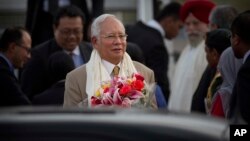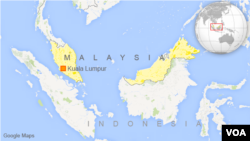The discovery of new and persistent Chinese coast guard activity in a tract of sea claimed by Malaysia adds public pressure on the Southeast Asian government to resist China, but is not seen as a tipping point in relations.
Three Chinese coast guard vessels patrolled waters off the Malaysian coast of Borneo over 60 days from December through late February, the Asia Maritime Transparency Initiative under U.S. think tank Center for Strategic and International Studies said this month.
Pressure on Malaysia for response
That finding will add public pressure on the Malaysian government of Prime Minister Najib Razak to step up resistance against China, analysts expect.
“I think certainly these are issues (that) will become a sticking a sticking point for Najib,” said Collin Koh, maritime security research fellow at Nanyang Technological University in Singapore.
“He wouldn't want to put foreign policy on center stage because this is going to become a particularly problematic issue that he will find very hard to deal with,” Koh said.
China's boats and one Malaysian coast guard vessel, apparently tracking the Chinese, were found near Luconia Shoals, the think tank initiative's website says.
In 2015, the country spotted a Chinese coast guard ship anchored at the same shoals, which are tiny South China Sea landforms in the Malaysian maritime exclusive economic zone about 100 kilometers north of Malaysia's Sarawak state on the island of Borneo.
The vessel spotted then had been there since 2013, the American think tank says. In March 2016 Malaysia spotted 100 Chinese fishing boats escorted by Beijing's coast guard.
Economic relations a factor
Najib usually avoids confronting Beijing because of tight Chinese-Malaysian economic relations. Malaysia counts China, the world's second largest economy, as its top trading partner and biggest source of direct foreign investment.
“For Malaysia, which has sought to maintain friendly relations with China, publicly condemning Chinese actions would disrupt that delicate balance and could have serious economic and other repercussions,” said Jonathan Spangler, director of the South China Sea Think Tank in Taipei.
Najib's coalition faces tough elections before the end of 2018 as Malaysia grapples with economic issues such as inflation and weak consumption.
Other countries concerned
China has reduced economic ties with South Korea, Taiwan and countries in Europe over the past decade when unhappy with their political decisions.
Beijing's “near-constant presence” at Luconia Shoals “does not garner much attention” but “speaks to Beijing's determination to establish administrative control throughout the nine-dash line,” the U.S. think tank's initiative says.
The submerged, oil-rich shoals are 2,000 kilometers from China and fall within Beijing's nine-dash line claim to more than 90 percent of the 3.5 million-square-kilometer South China Sea.
The sea is contested all or in part by Malaysia and four other governments. Asian nations have pursued it for abundance of fisheries, marine shipping lanes and fossil fuel reserves under the seabed. Malaysia is the biggest prospector of oil and gas.
Some people in the country of 31 million feel their government reacts too passively to China's ship movements, Koh said. Partly to monitor China, Malaysia is replacing 50 percent of its naval ships to make the fleet viable through 2030.
China maintains the world's third strongest military compared to Malaysia at No. 34, the database GlobalFirePower.com says.
Domestic issues
But compared to people in Vietnam and the Philippines, which also vie with China over parts of the sea, Malaysians are focused more on domestic issues rather than foreign vessels offshore, said Oh Ei Sun, international studies instructor at Singapore Nanyang University.
“For Malaysians, I think it's because we are really blessed with a lot of natural resources so people are sort of inward looking,” Oh said. “They don't quite pay a lot of attention to this sort of international matters even if it happens in the surrounding waters.”
Public pressure on the Malaysian government would rise fast if China began stopping Malaysian fishing vessels in the exclusive economic zone, Koh said.
China's diplomatic balancing act
But China is careful to avoid sparking strong protests as it locks in its maritime claims, analysts say. A dispute over Scarborough Shoal near the Philippines in 2012 prompted Manila to file for world court arbitration. An arbitration tribunal ruled in favor of the Philippines in July, a decision Beijing called a “farce.”
“For China, it has demonstrated that it is willing and able to increasingly securitize its claimed territories, but overdoing it could eventually provide rival claimants the impetus for mustering a united regional response,” Spangler said.
China has offered economic incentives elsewhere in Southeast Asia in exchange for tolerance of its maritime expansion. Countries such as Malaysia's neighbor Brunei, and more recently the Philippines, have obliged.





